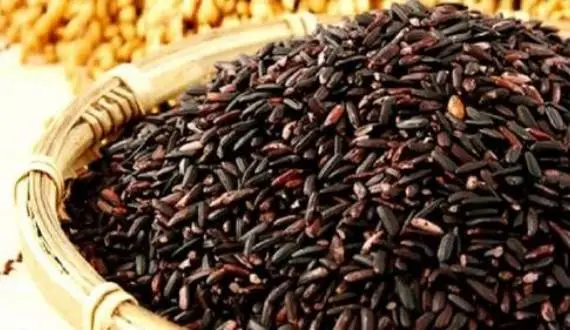Introduction
In the heart of Tamil Nadu, amidst lush paddy fields and a rich agricultural heritage, lies a hidden gem known as Karun Kuruvai rice. This traditional variety of rice, deeply rooted in the culture and history of the region, is gaining renewed attention for its unique qualities and health benefits. Join us as we explore the fascinating world of Karun Kuruvai rice.
The Legacy of Karun Kuruvai Rice
Karun Kuruvai is a traditional variety of rice that has been cultivated in Tamil Nadu for centuries. Its name, "Karun" meaning black and "Kuruvai" referring to the short-term cropping season, hints at its distinctive dark hue and the season it is grown. This rice is typically sown during the Kuruvai season, which spans from June to September, taking advantage of the monsoon rains.
Cultivation and Sustainability
One of the remarkable aspects of Karun Kuruvai rice is its resilience and adaptability. It thrives in the diverse climatic conditions of Tamil Nadu, from the fertile plains to the delta regions. Farmers appreciate this variety for its hardiness, as it requires less water compared to other paddy varieties, making it an ideal choice in regions with water scarcity.
Furthermore, Karun Kuruvai rice is often grown using traditional organic farming methods. These practices not only help in preserving the soil health but also contribute to the overall sustainability of the agricultural ecosystem. By choosing Karun Kuruvai, consumers support environmentally friendly farming practices that have been passed down through generations.
Nutritional Benefits
Karun Kuruvai rice is not just celebrated for its cultural significance but also for its impressive nutritional profile. Here are some key benefits:
- Rich in Antioxidants: The dark hue of Karun Kuruvai rice is attributed to the presence of anthocyanins, potent antioxidants that help in fighting free radicals and reducing inflammation.
- High in Fiber: This rice variety is an excellent source of dietary fiber, promoting healthy digestion and aiding in weight management.
- Low Glycemic Index: Karun Kuruvai rice has a low glycemic index, making it a suitable choice for individuals managing diabetes as it helps in maintaining stable blood sugar levels.
- Packed with Minerals: It is rich in essential minerals like iron, zinc, and magnesium, which are crucial for maintaining overall health and well-being.
Culinary Delights
Karun Kuruvai rice lends itself beautifully to a variety of dishes. Its unique texture and flavor profile make it a versatile ingredient in both traditional and contemporary recipes. Here are a few culinary delights you can create with this exceptional rice:
- Karun Kuruvai Pongal: A wholesome and nutritious version of the popular South Indian dish, perfect for breakfast.
- Black Rice Salad: A colorful and vibrant salad packed with vegetables and dressed with a tangy vinaigrette.
- Karun Kuruvai Payasam: A delectable rice pudding made with coconut milk, jaggery, and cardamom, ideal for festive occasions.
Recipes
Here's a traditional recipe to make this delightful sweet treat:
1.Karun Kuruvai Payasam
Ingredients:
- 1/2 cup Karun Kuruvai rice
- 4 cups milk (you can use whole milk or a mixture of milk and water)
- 1/2 cup jaggery (adjust according to sweetness preference)
- 2 tablespoons ghee (clarified butter)
- 1/4 teaspoon cardamom powder
- 10-12 cashew nuts
- 10-12 raisins
- A pinch of saffron strands (optional)
Instructions:
1. Prepare the Rice:
- Wash the Karun Kuruvai rice thoroughly in water 2-3 times to remove any impurities.
- Soak the rice in water for at least 30 minutes to help it cook faster and more evenly.
2. Cook the Rice:
- In a heavy-bottomed pan, add the soaked rice and 2 cups of water.
- Cook the rice on medium heat until it is soft and fully cooked. Stir occasionally to prevent sticking.
3. Add Milk:
- Once the rice is cooked, add the 4 cups of milk to the pan.
- Bring the mixture to a boil, then reduce the heat to low and let it simmer.
- Stir occasionally to prevent the rice from sticking to the bottom of the pan.
4. Add Jaggery:
- In a separate pan, melt the jaggery with a little water until it is fully dissolved.
- Strain the jaggery syrup to remove any impurities.
- Add the strained jaggery syrup to the rice and milk mixture. Mix well.
5. Flavor the Payasam:
- Add the cardamom powder to the payasam and mix well.
- If using saffron, soak the saffron strands in a tablespoon of warm milk and add it to the payasam for added flavor and color.
6. Prepare the Garnish:
- In a small pan, heat the ghee and fry the cashew nuts until they are golden brown. Remove and set aside.
- In the same pan, fry the raisins until they puff up. Remove and set aside.
7. Combine and Serve:
- Add the fried cashew nuts and raisins to the payasam.
- Mix well and let the payasam simmer for a few more minutes to blend the flavors.
8. Serve:
- Serve the Karun Kuruvai Payasam warm or chilled, as desired.
Enjoy your nutritious and delectable Karun Kuruvai Payasam, perfect for festive occasions or as a comforting dessert!
Supporting Local Farmers
By choosing Karun Kuruvai rice, you are not only embracing a healthier lifestyle but also supporting the livelihoods of local farmers. The demand for traditional rice varieties encourages farmers to continue cultivating these heritage grains, thereby preserving agricultural biodiversity and cultural heritage.
Conclusion
Karun Kuruvai rice is more than just a staple; it is a symbol of Tamil Nadu's rich agricultural tradition and a testament to sustainable farming practices. Whether you are a health enthusiast, a culinary explorer, or someone passionate about supporting local communities, Karun Kuruvai rice offers something for everyone. So, the next time you are at your local market, make sure to pick up this incredible rice variety and savor the taste of tradition.


